
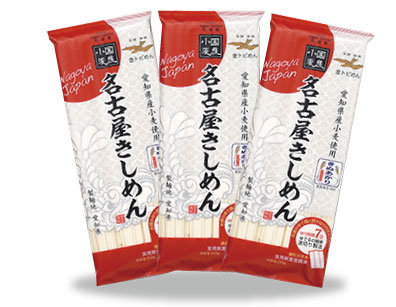
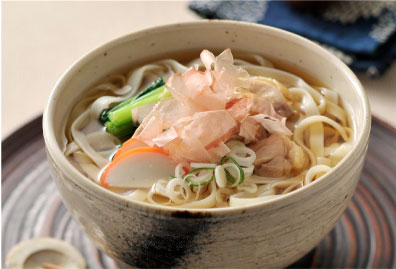
Kin Tobi Shiga's "Kin Tobi Men" noodles are manufactured under consistent control – from the selection of the raw-material wheat and milling of the flour, to the production of the noodles. Our dried noodles and semi-raw noodles are produced using only freshly-milled, quality wheat flour, carefully milled in-house, with proven techniques and skills built up over more than 60 years, and proprietary noodle making methods learned from hand-made udon noodles, and they feature the sweet aroma and rich flavor unique to wheat.
"Kin Tobi Men", with its delicious taste and quality, has won awards for various products, starting with the wining the Monde Selection Gold Award in 2010. With our accumulated traditions and proven techniques, we will continue to deliver the safe and reliable, delicious taste that never changes.
Noodle factory (Hamacho factory) Facility daily output capacity 7.2t
* Daily output: 1,200 cases/6kg
Acquired ISO9001 certification
Acquired HACCP certification
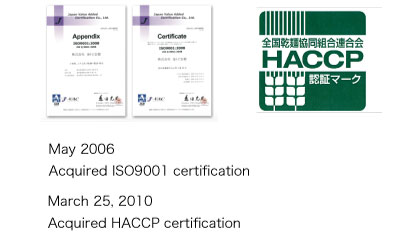
At our ISO9001 certified flour milling factory, we practice thorough quality control. We are constantly making improvements, and make safe noodles production our number one priority. Moreover, Kin Tobi Shiga Co., Ltd., is an HACCP (internationally recognized food safety management system) certified dried noodle factory.
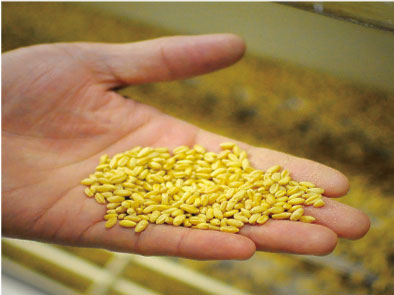
Even today, as we have shifted from stone hand milling at our inception to modern roll-type milling, Kin Tobi Shiga is still particular about milling flour gently, slowly and carefully. By suppressing damaged starch in this way, the natural fragrance of the wheat is not lost, and it is possible to produce wheat flour that takes water slowly and is perfectly suited to hand-made udon noodles.
Wheat quality varies from harvest to harvest; but Kin Tobi Shiga, with data accumulated over around 100 years and careful craftsmanship, always reliably delivers the finest flour. Having building trust with reliable quality, our flour continues to be the favorite of many famous handmade udon stores, that have been using it for many years.
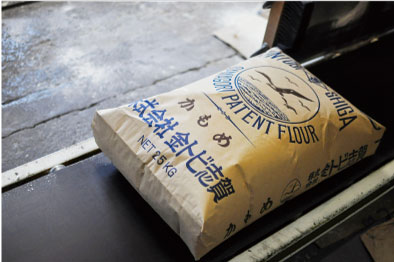
There are three main types of flour: strong, medium and weak. Kin Tobi Shiga, has set up its factory diagram to mild only udon flour (medium). By specializing in this way, it is possible to bring out the characteristics of wheat when it is turned into flour and the flavor of the ingredients, to their fullest.
Flour mill (Main factory) Facility daily output capacity 100t
* Daily output: 4,000 bags/25kg
Acquired ISO9001 certification
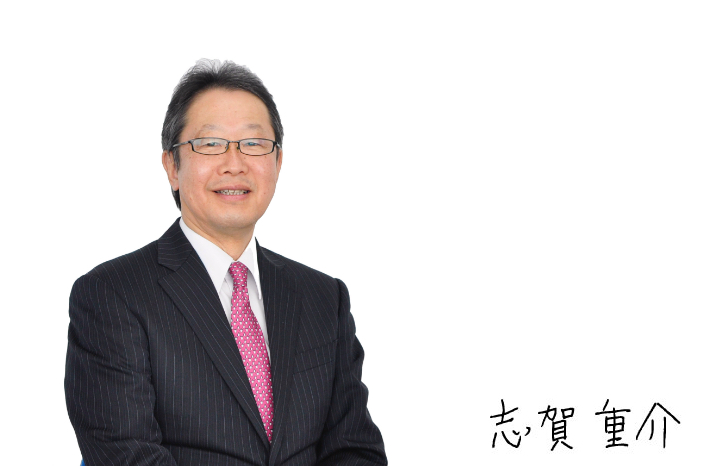
A new era called the Meiji began about 150 years ago and ended up wars and chaos. 75 years later, the failure in WWII led to the purge, dissolution of financial cliques, and the reformation of farmlands so the revival of the Japanese economy all began in the burning fields. And now, another 75 years later, a major change called the Industrial Revolution is about to take place. Experiencing the major changes in modern Japan, Kintobishiga knows that it’s not going to survive the Industrial Revolution simply by following the path of its predecessors. To embark on a great voyage, we have to be curious like children, decisive, and capable to read the wind ahead. We’d love to learn from the classics and wittily step forward in such a discontinuous times.
| August 1917 | First president, Hachigoro Shiga , starts a rice shop and flour shop |
|---|---|
| January 1950 | Shiga Seifun-jo Co. Ltd. established |
| January 1950 | Flour products named "Kin Tobi brand " |
| May 1953 | Highest-quality noodle flour "Kamome" (25kg) goes on sale |
| December 1955 | Renamed "Yaotomi no Ito" to "Kin Tobi Men" |
| December 1960 | Jinichi Shiga becomes second president of the company |
| September 1966 | Highest-quality dried noodles "Tokyu Kin Tobi Men" go on sale |
| September 1975 | New Head Office premises built |
| April 1977 | Nagoya office built |
| September |
Hamacho noodle factory built |
| January 1988 | Hiroshi Shiga becomes third president of the company |
| April 2000 | Merged with sales company Kin Tobi Shokuhin, changed company name to "Kin Tobi Shiga Co., Ltd." |
|
|
Completed construction of new noodle factory "Kaito" |
|
May 2006 |
Acquire lSO9001 certification |
|
December 2007 |
Jusuke Shiga becomes fourth president of the company |
| May 2008 | Certified as an Aichi brand company |
| April 2010 |
Natsuaji no Udon wins the 2010 Monde Selection Gold Award |
| February 2012 | Started home-delivery water sales business |
| April | Kamaage Udon wins the 2012 Monde Selection Gold Award |
| March 2013 | Hamacho factory acquires HACCP certification |
| April | Kokusan Kishimen wins the 2013 Monde Selection Gold Award |
| May | Noodle flour made from 100% Aichi grown wheat "Kin Tobi Kinuakari" (25kg) goes on sale |
| September |
Kin Tobi Kokusan Miso Nikomi Udon goes on sale |
| April 2014 | Gamagori Mikan Noodles (kishimen, udon, hiyamuki) goes on sale |
| July |
Aichi produced wheat "Kin Tobi Kinuakari Udon" goes on sale |
| September | Gamagori Udon for 2, 4 goes on sale |
| Kin Tobi Kokusan Curry Nikomi Udon goes on sale | |
| March 2015 | Aichi produced wheat "Kin Tobi Kinuagari Somen" goes on sale |
| Aichi produced wheat "Kin Tobi Kinuagari Reimen" goes on sale | |
| April | Kinuakari Udon wins the 2015 Monde Selection Gold Award |
| October | Aichi produced wheat "Kin Tobi Nagoya Kishimen" goes on sale |
| February 2016 |
Commercial-use Kin Tobi tempura flour 10kg goes on sale |
| April | Gamagori Udon for 4 wins the 2016 Monde Selection Gold Award |
| August | Gamagori Udon for 4 wins the 2016 Aichi Food Product Contest Award for Excellence |
| December | Gamagori Udon for 2 wins the Grand Prize, Aichi Governor's Award in the Aichi-Nagoya Food and Sweet Souvenir Contest - Judged by 100 Foreigners |
| August 2017 | 100th anniversary of foundation |
| Toyohashi factory establishment | |
| September 2018 | White soy sauce kishimen nationwide release |
The Kinuakari ramen noodle Sale |
|
Official home page renewal |
|
Hamacho plant received Aichi prefectural governor award at Aichi prefecture food sanitation meeting |
|
| January 2019 | Aichi Kinu Akari wheat products are certified as “Triple circle food” in 2019 |
| October | Awarded the “Ministry of Agriculture, Forestry and Fisheries Food Industry Bureau Award” in the award presentation for beneficial activities such as local production for local consumption in 2019. |
| November | In commemoration of the 5th anniversary of the release of Gamagori Udon, launched two products of “Vongole Bianco Flavor”. |
| February2021 | Launched “Shredded Chilled Udon”, a functional food |
| January 2022 | “Shredded Chilled Udon”, a functional food Received the 2021 Higashi Mikawa Manufacturing Award |
| August | “Shredded Chilled Udon”, a functional food Received the Excellence Award in the 2022 Aichi Hometown Food Contest |
| February 2023 | At the Aichi Brand Innovation Award 2022, “Expanding sales channels through the development of dried noodles of shredded zaru udon, a food with functional claims using Kinuakari wheat produced in Aichi prefecture” received a special award. |
| March | Limited quantity sale of “Ieyasu Kunkishimen” |
| Nagoya Kishimen summer package on sale for a limited time | |
| Kintobimen official LINE started | |
| May | Kintobimen official Instagram started |
| September | “Domestic kishimen”, “miso stewed udon”, and “curry stewed udon” are now on sale again |
| October | Hamacho Factory received the Minister of Health, Labor and Welfare Award as an excellent food hygiene facility in 2021. |
| SDGs declaration | |
| November | Kinukinu Akari products received the Association Chairman's Award from the 26th Packaged Food Technology Association in recognition of their planning and technical capabilities. |
| March 2024 | “Kinuakari Somen”, “Kinuakari Hiyamugi” has been renewed |
| October 2024 | Updated corporate logo and mission statement. ・Corporate statement: “Bringing bright smiles from food” ・Kintobimen brand mission statement: “Delicious shapes made with wheat” |
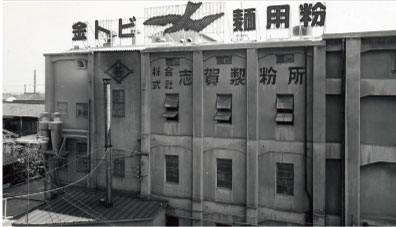
| Company Name | Kintobi Shiga Co., Ltd. |
|---|---|
| Line of business | Manufacture and sales of wheat flour and dried noodles; home-delivery water sales |
| Started | 1917 |
| Established | January 30, 1950 |
| Capital | 47.92 million yen |
| Representative | President, Jusuke Shiga |
| Main Banks | MUFJ Bank, Gamagori Shinkin Bank |

Our founder, Hachigoro Shiga, was born in Nishi-ku, Nagoya City, in 1893. In 1917, he moved to Gamagori with his wife and children and started a flour milling and noodle making business. Gamagori looks out on Mikawa Bay, and you can often see flocks of kites (Tobi) that fly on the sea breeze. Hachigoro dreams for his business were by sight of the birds soaring high in the sky and he decided on the "Tobi mark" for his flour. Further inspired by the "Kin no Shachihoko", pride of his hometown of Nagoya, and the history of the Emperor Jinmu's "Kin Tobi", he named his highest quality flour "Kin Tobi" and put it on the market.
In particular, Hachigoro's dried noodles, which were highly praised for their excellent flavor, came to be known as "Kin Tobi Men", and even today as we celebrate the 100th anniversary of our founding, they continue to be loved by many of our customers.
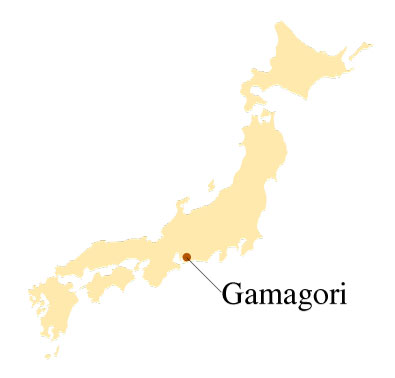
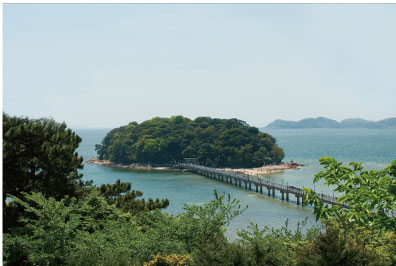
Nature rich tourist city "Gamagori" is surrounded by green mountains and the tranquil sea of Mikawa Bay. There are four hot springs in the city, each with a different atmosphere, and area has been visited as a resort by many people since ancient times. The scenic views of the sea and mountains are reminiscent of Kamakura, and the calm and quiet sea is like the Seto Inland Sea.
Aichi prefecture has long periods of sunshine, suitable for cultivating wheat, and it ranks fifth in Japan for production volume.
